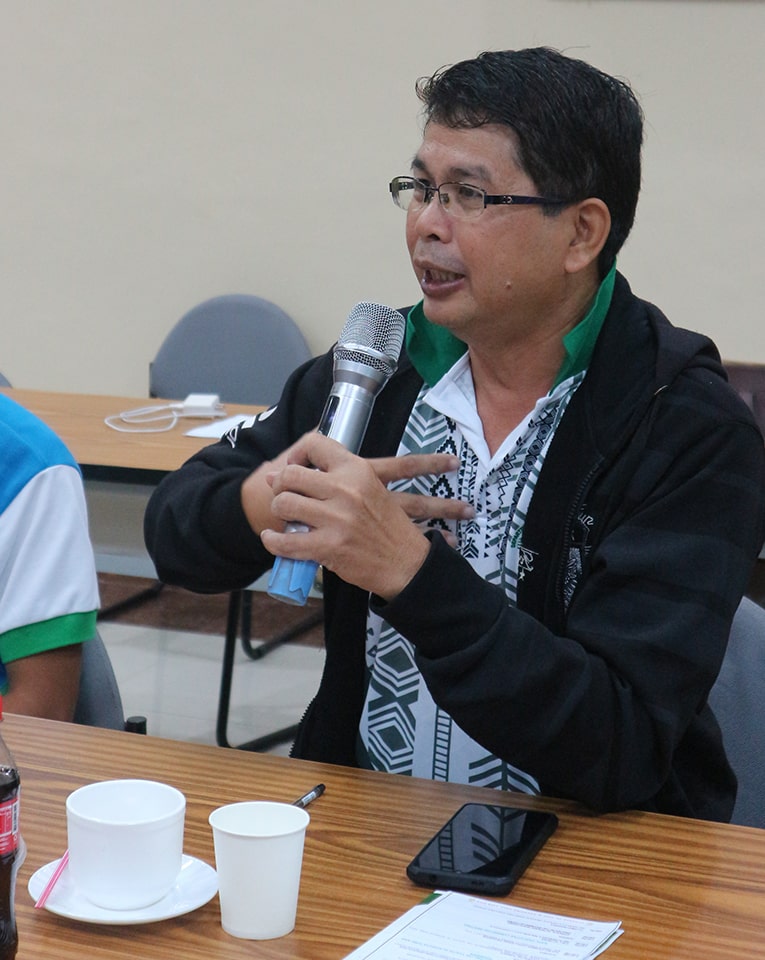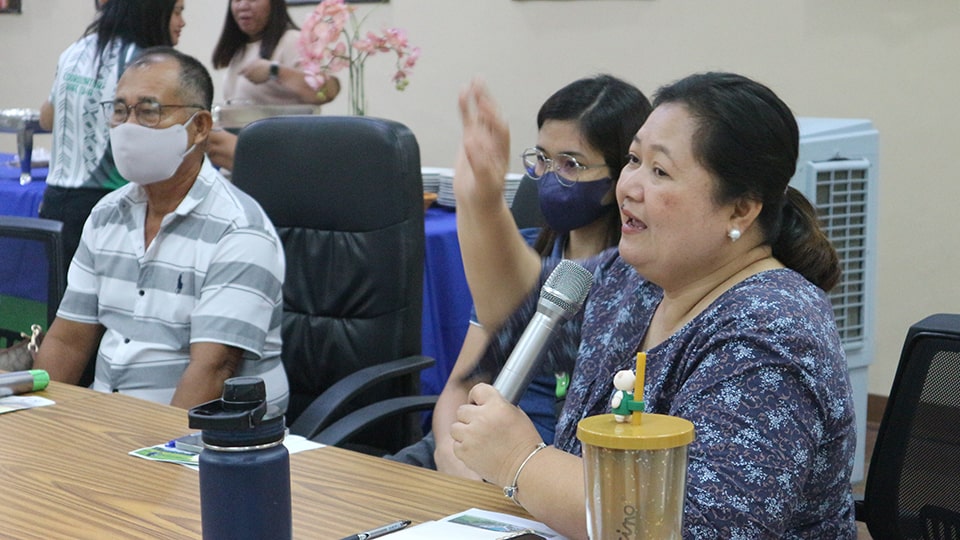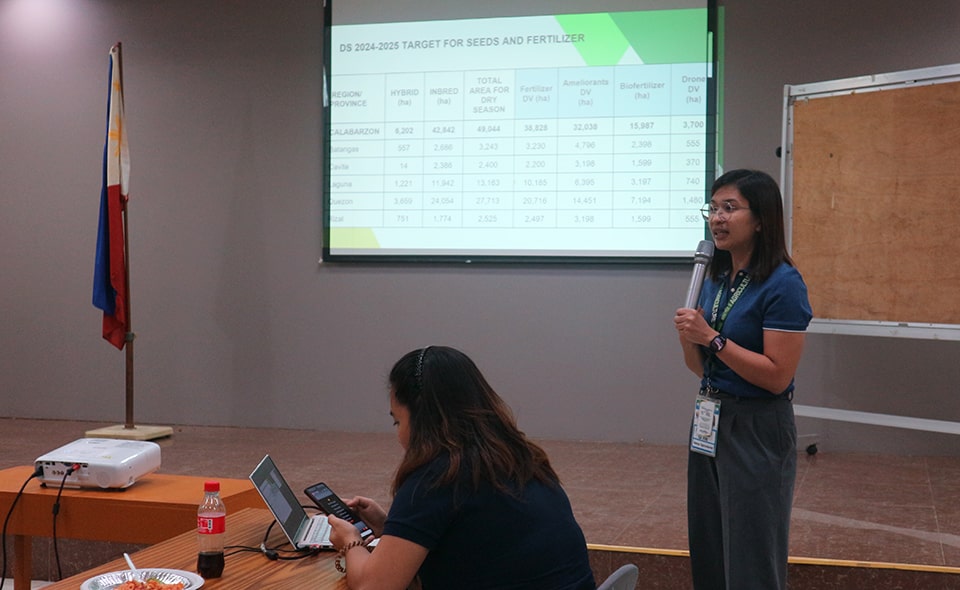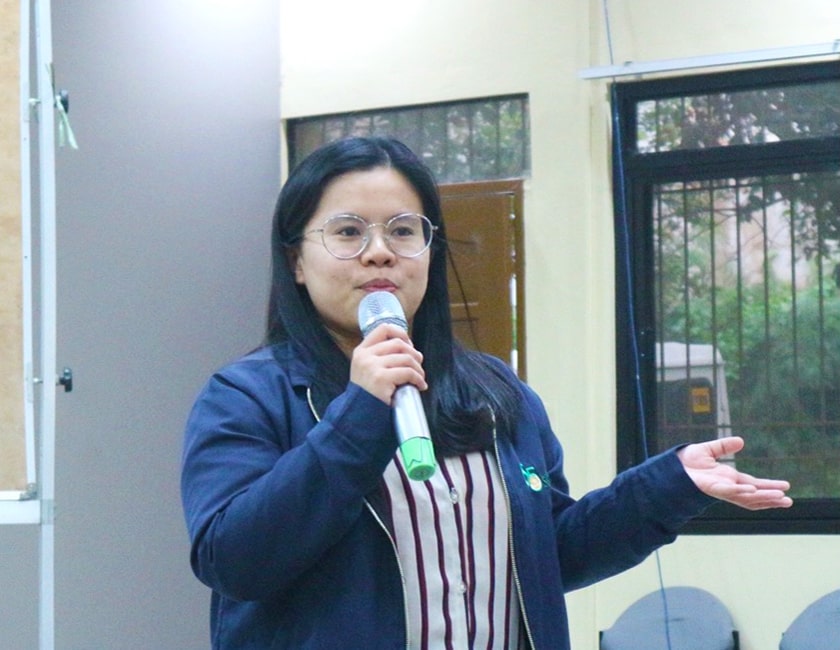The Southeast Asian Regional Center for Graduate Study and Research in Agriculture (SEARCA) promoted climate-mitigation agricultural initiatives and youth participation opportunities during the Regional Agricultural and Fishery Council (RAFC's) Sectoral Committee Meeting on Rice and Other Staples and Youth in Agriculture and Fisheries at the Philippine Department of Agriculture Regional Field Office 4 in Lipa City, Batangas held on 22 October 2024.
 Ms. Lichelle Dara Carlos presented SEARCA's climate-mitigating projects on rice industry.
Ms. Lichelle Dara Carlos presented SEARCA's climate-mitigating projects on rice industry.
The Sectoral meeting was attended by representatives from the Department of Agriculture Regional Field Office IV, RAFC Executive Committee from the provinces of Laguna, Rizal, and Quezon, RAFC Sectoral Committee on Rice and other food staples, Provincial Agricultural and Fishery Council (PAFC) and Highly Urbanized and Fishery Council (HUCAFC) Coordinators.
During the program, Ms. Lichelle Dara Carlos, Program Specialist of SEARCA's Emerging Innovation for Growth Department (EIGD), discussed the escalating problem of global warming, which is significantly affecting the agricultural sector. Since her discussion revolved around using rice straw in producing biogas and mitigating the harmful effect of climate change, the Rice Straw Biogas Hub (RSBH) team prepared questions probing whether the farmers use rice straws, as well as how they were affected by the climate change. Almost all of those who responded stated that they recognize the use of rice straws. The brief survey results indicate the group's awareness of the repercussions of climate change in agriculture.
In her presentation, Ms. Carlos highlighted the current efforts of SEARCA toward utilizing agricultural waste, such as rice straws for biogas and other alternative uses. Currently, the RSBH project, a collaborative project with Straw Innovations Ltd., Aston University, and KoolMill Systems Ltd., is finding ways to practice a circular economy for less carbon emission rice.
On the other hand, she also introduced the Web-based Integrated Spatial Engine and Smart Ecosystem (WISE) Carbon Farming project that advocates for carbon farming practices. The project also seeks to establish standards that would enable the agro-industry to offer carbon credits in the future.
In addition to highlighting SEARCA's current climate-mitigation projects, Ms. Carlos shared details on the partnership established with Straw Innovations, Ltd. and PAFC-Laguna. The collaboration focused on reinforcing the commitment toward sustainable agricultural practice while addressing the impacts of climate change.
 Mr. Roel Fabillan discussed PAFC Laguna's collaboration with SEARCA and Straw Innovations, Ltd. to mitigate climate change and properly manage rice straws.Mr. Roel Fabillan, PAFC Laguna Chairperson, also shared how the council will immensely benefit from this collaboration, as not only does it help the environment but also promotes climate-friendly farming practices and implementation of modern technologies, especially in rice straw management. He also encouraged all the participants to engage in the activities of this collaboration.
Mr. Roel Fabillan discussed PAFC Laguna's collaboration with SEARCA and Straw Innovations, Ltd. to mitigate climate change and properly manage rice straws.Mr. Roel Fabillan, PAFC Laguna Chairperson, also shared how the council will immensely benefit from this collaboration, as not only does it help the environment but also promotes climate-friendly farming practices and implementation of modern technologies, especially in rice straw management. He also encouraged all the participants to engage in the activities of this collaboration.
Ms. Maria Ella Cecilia Obligado, Chief of the Planning, Monitoring & Evaluation Division (PMED) and Executive Officer of the Rice Action for Climate (RAFC) highlighted the potential of SEARCA's initiatives in advancing responsible rice straw management practices. During her address, she urged all members to verify whether municipalities within their jurisdiction have enacted ordinances prohibiting the burning of rice straw. She underscored the importance of this effort as an opportunity not only to assess the current state of rice straw management but also to collect crucial data on whether burning is still prevalent among farming sectors.
Additionally, Obligado encouraged participants to consider adopting similar agreements to those implemented by PAFC Laguna, where municipalities have successfully collaborated on rice straw management. She stressed, "Kung sa tingin ninyo ay makakabuti sa inyo, maaaring makipag-ugnayan ang lahat ng munisipalidad sa parehong kasunduan na ginawa ng (PAFC) Laguna. [If you think it's beneficial for you, all municipalities can sign up the same agreement to that of (PAFC) Laguna."
 Maria Ella Cecilia Obligado urged everyone to verify the ordinances on rice straw management from their respective municipalities and check how DA, LGUs, and farming sectors could intervene for stronger implementation.
Maria Ella Cecilia Obligado urged everyone to verify the ordinances on rice straw management from their respective municipalities and check how DA, LGUs, and farming sectors could intervene for stronger implementation.
On the other hand, Ms. Flordeliza Maleon, RAFC Chairperson, expressed her support for this action and urged everyone to take measures to draft ordinances and intensify efforts to ban the burning of rice straws. She emphasized that such practices harm the environment, contribute to global warming, and exacerbate climate change.
Ms. Maricris Ite, Rice Program Coordinator at the Department of Agriculture (DA), highlighted the agency's key development initiatives, with a particular focus on the MaSaGaNa (Matatag, Sama-sama, Ganado at Napapanahon) Rice Industry Development Program. This program is designed to enhance rice production, increase farmers' income, and ensure farming communities' long-term sustainability and resilience, enabling them to better adapt to climate change.
 Ms. Maricris Ite discussed the MaSaGaNa Rice Industry Development program.
Ms. Maricris Ite discussed the MaSaGaNa Rice Industry Development program.
Before concluding the sectoral meeting, Mr. Demosthenes Hernandez, Chair of Quezon's Provincial Agricultural and Fishery Council (PAFC), underscored the importance of reviewing all available guidelines. His remarks addressed concerns raised by members regarding the distribution of financial assistance and subsidies, stressing the need to ensure that "walang maiiwan sa laylayan [no one is left behind]."
 Ms. Loise Ann Carandang was promoting the SEARCA initiatives on youth engagement in agriculture.In the afternoon, other matters beyond the climate-related projects were covered during the meeting, and among these were the programs and grants provided for the youth in CALABARZON. Ms. Loise Ann Carandang, Senior Associate for Communications of Partnership Unit (PU) and Youth Co-Lead, presented the Center's banner youth engagement initiative, Young Forces for Agricultural Innovation (#Y4AGRI), and its ongoing initiatives to increase youth engagement in agricultural and rural development in Southeast Asia. She also encouraged attendees to apply for the SEARCA's Graduate Scholarships Program for those interested in pursuing postgraduate studies in agriculture and related fields.
Ms. Loise Ann Carandang was promoting the SEARCA initiatives on youth engagement in agriculture.In the afternoon, other matters beyond the climate-related projects were covered during the meeting, and among these were the programs and grants provided for the youth in CALABARZON. Ms. Loise Ann Carandang, Senior Associate for Communications of Partnership Unit (PU) and Youth Co-Lead, presented the Center's banner youth engagement initiative, Young Forces for Agricultural Innovation (#Y4AGRI), and its ongoing initiatives to increase youth engagement in agricultural and rural development in Southeast Asia. She also encouraged attendees to apply for the SEARCA's Graduate Scholarships Program for those interested in pursuing postgraduate studies in agriculture and related fields.
The RAFC Sectoral and Executive Meeting, led by the DA Regional Offices, serves as a consultative platform for monitoring and evaluating the progress of current agricultural programs and activities. Additionally, it allows DA and the RAFC to discuss challenges and identify opportunities, formulating resolutions and policy recommendations to improve farmers' livelihoods and address climate-related issues.